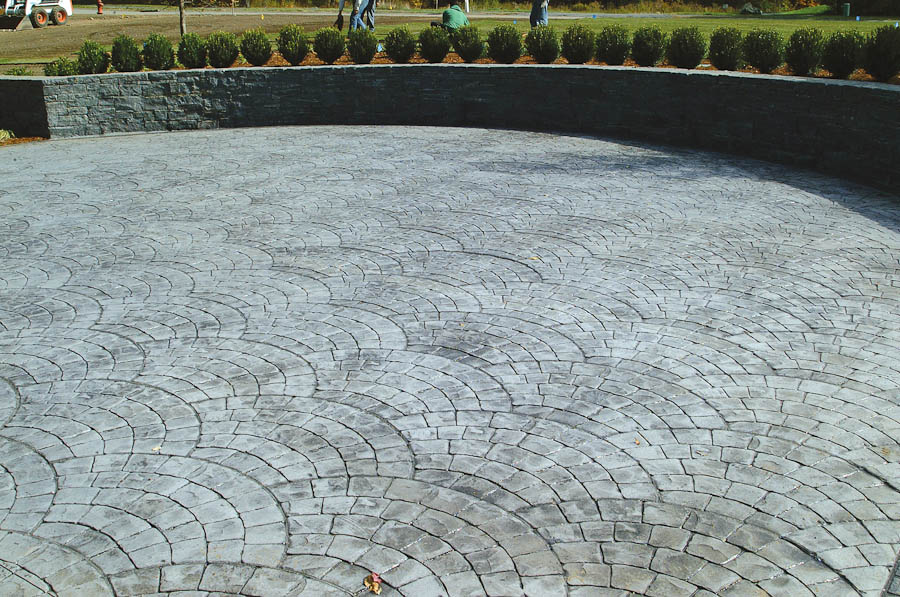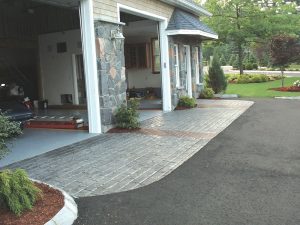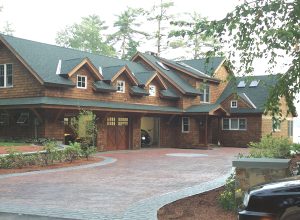
Installing a concrete driveway is a major investment, and its success depends on more than just how it looks. One of the most critical, but often overlooked, factors is the thickness of the slab, which raises the question: how thick should a concrete driveway be?
Whether you’re replacing an aging driveway or planning new construction, getting the thickness right is essential for supporting vehicle loads, resisting cracking, and withstanding the elements over time. The ideal thickness can vary based on several factors, including the type of vehicles you drive, local soil conditions, and climate. Although this guide breaks down everything you need to know to ensure your driveway is built to last, it is best to work with hardscaping experts like those at Triad Associates to ensure long-lasting results.
How Thick Should a Concrete Driveway Be?
When planning a new concrete driveway, one of the most critical considerations is thickness. The proper thickness ensures that your driveway can handle daily use, resist cracking, and last for decades with minimal maintenance. A standard residential concrete driveway is typically 4 inches thick, but depending on usage and site conditions, this can increase to 5 or even 6 inches for added strength and durability.
Several factors can influence the optimal thickness of your concrete driveway. Understanding these variables will help you make informed decisions that align with your property’s needs, your budget, and local requirements.
Key Factors Influencing Driveway Thickness
 There are several key factors that influence driveway thickness, and some will be more important than others. The experts at Triad Associates can advise you on how these factors affect decisions like how thick should a concrete driveway be, and what the best thickness would be for your project.
There are several key factors that influence driveway thickness, and some will be more important than others. The experts at Triad Associates can advise you on how these factors affect decisions like how thick should a concrete driveway be, and what the best thickness would be for your project.
Purpose and Functionality
How your driveway will be used is the first and most essential consideration. A driveway used solely for personal vehicles may require only the standard 4 inches of thickness. However, if you plan to park RVs, trailers, or commercial vehicles, a thicker slab will be necessary to support the additional load.
Vehicle Type and Weight Considerations
Light passenger cars exert less stress on concrete than larger trucks or heavy equipment. If your household includes heavier vehicles like delivery vans, boats on trailers, or work trucks, a thickness of 5 to 6 inches is recommended to avoid premature cracking or structural failure.
Soil Conditions and Subgrade Support
The strength of the soil beneath the driveway plays a significant role in determining required thickness. Soft, expansive, or poorly compacted soils can lead to shifting and settling. In these cases, thicker concrete or a well-prepared gravel subbase may be needed to provide proper support.
Climate and Weather Impact
Regions with freeze-thaw cycles or high precipitation levels require additional thickness to reduce cracking and moisture infiltration. In colder climates, thicker concrete (often 5 inches or more) combined with air entrainment additives helps prevent freeze-related damage over time.
Local Building Codes and Regulations
Local municipalities may have building codes that dictate how thick should a concrete driveway be, especially for new constructions or in neighborhoods with strict zoning requirements. Always check with your local permitting office to ensure compliance. The professionals at Triad Associates have intimate knowledge of the local building codes and regulations and can advise on these as related to your driveway project.
Budget Considerations for Driveway Installation
While a thicker driveway offers enhanced durability and lifespan, it also comes with higher material and labor costs. Balancing performance needs with budget constraints is key. Opting for a slightly thicker slab up front may cost you a bit more, but it can save you costly repairs or replacements down the line, leading to a net savings.
Importance of Edge Support and Reinforcement
Even with ideal thickness, a concrete driveway can fail prematurely without adequate edge support and reinforcement. Edges are the most vulnerable areas as they’re more exposed to weight transfer, weathering, and erosion. Reinforcing these zones helps distribute loads evenly and prevents cracking or crumbling at the perimeter.
Do You Need Concrete Reinforcement?
Yes, reinforcement is essential for most driveways, especially those handling heavier vehicles or those built on weaker soil. Reinforcement enhances the driveway’s tensile strength, helps control cracking, and extends the surface’s overall durability. Reinforcement is particularly critical when pouring slabs that are 5 inches or thicker.
Methods for Reinforcement
 There are two primary methods of reinforcing a concrete driveway:
There are two primary methods of reinforcing a concrete driveway:
- Steel Rebar: Ideal for driveways supporting heavy loads, rebar is laid in a grid pattern throughout the slab. It provides maximum strength and helps prevent cracking due to stress or shifting soil.
- Wire Mesh: Welded wire mesh is a more economical option for residential driveways. It helps hold the concrete together if cracks occur, though it offers slightly less structural integrity than rebar.
Other additives like fiber reinforcement – tiny synthetic fibers mixed directly into the concrete – can also help reduce shrinkage and surface cracking. Your contractor will advise on the best method for your site and your budget.
Potential Consequences of Incorrect Thickness
Pouring a driveway that is too thin or poorly supported can lead to a host of problems, including:
- Surface cracking and spalling
- Edge deterioration
- Uneven settling or heaving
- Reduced lifespan and costly repairs
- Drainage issues due to slab displacement
Understanding how thick should a concrete driveway should be is crucial, as getting the thickness right from the start, along with reinforcement, promotes the long-term success of your installation.
Choosing Between DIY and Professional Installation
While it may be tempting to take on a driveway pour yourself, working with concrete is a technical task requiring proper tools, experience, and site preparation. Errors in grading, mixing, pouring, or curing can severely impact the quality of the finished surface. For homeowners without concrete experience, hiring professionals is the most efficient and cost-effective approach.
Finding a Reliable Concrete Contractor in Haverhill, MA
When selecting a contractor, look for companies with proven experience in residential concrete projects, strong customer reviews, and familiarity with local building codes. Be sure to ask about warranties, project timelines, and reinforcement options. A reputable contractor will walk you through the entire process and help ensure that your driveway is built to last.
Work with Triad Associates’ Concrete Experts
For homeowners in Haverhill, MA, Triad Associates offers unmatched expertise in designing and installing concrete driveways built for New England conditions. From addressing questions like “how thick should a concrete driveway be” to assessing soil conditions and selecting the proper thickness and reinforcement strategy, our team brings precision and quality to every job. Whether you’re installing a new driveway or replacing an old one, trust Triad Associates to deliver durable, professional results. Contact us today to schedule a consultation!




